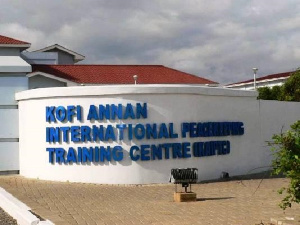 Entrance of the Kofi Annan International Peacekeeping Training Centre (KAIPTC) in Accra
Entrance of the Kofi Annan International Peacekeeping Training Centre (KAIPTC) in Accra
The Kofi Annan International Peacekeeping Training Centre (KAIPTC) and the National Peace Council (NPC) have jointly organised a workshop to re-examine national efforts towards the implementation of peace infrastructure in five ECOWAS member countries including Ghana, Sierra Leone, Ivory Coast and Senegal.
The three-day workshop, which opened in Tamale on Tuesday, and being attended by representatives from the NPC, security agencies and some civil society organisations from the northern part of the country, is on the theme: “Ascertaining Vulnerabilities and Resilience in Peace Infrastructures in West Africa”.
With the increasing and evolving security challenges in the West African region, it is crucial to assess the resilience of existing local and national peace infrastructures to address and overcome conflicts including violent extremism, cross-border crimes, armed robbery amongst others hence the workshop.
Participants were taken through various topics including emerging security challenges in West Africa and leveraging regional peace architectures for response, governance and leadership in peacebuilding, gender and security governance, challenges and opportunities in building and sustaining peace in Ghana, conflict analysis, early warning and response in Ghana and West Africa amongst others.
Professor Kwesi Aning, Director, Faculty of Academic Affairs and Research, KAIPTC called on governments in the five countries to ensure that their assessment of threats in the sub-region were based on a technocratic point of view rather than a political point of view for appropriate responses to achieve maximum results.
He was making a presentation on the topic: “Understanding Emerging Security Challenges in West Africa and Leveraging Regional Peace Architectures for Response”.
He observed that “We seem to have a very altruistic understanding and assessment of the threats that we face. Until we use rational choice calculous to say, what is good is that these individuals and groups are doing what they do, then the analysis is not going to be right and we are not going to be able to pinpoint and respond with the appropriate force and understanding that we need. Continuing along the path that we have always done; it is not going to help us”.
He spoke about emerging security challenges in the sub-region saying “It is becoming clear that representatives of State and State institutions’ capacity to respond to those, who threaten the State, over time, is becoming weaker because of lack of coordination, and competition.”
He said “while those, who seek to threaten the State, are more flexible, able to act with speed, change direction of what they want to do and collaborate and share information much better and effectively to be able to respond to, identify and degrade the challenges that we are facing coming from violent extremism” State institutions did not coordinate their activities neither did they act with speed.
Professor Aning, therefore, called for improvement in levels of coordination amongst different State actors to ensure effective response to threats, saying “Normally, people think it is about equipment but I think it is more coordination, communication networks, and trust “.
He called for the provision of the skills set to the frontline officers, who he said must be equipped to see fairly innocuous individual developments and to be able “to pool these individual developments to tell us a story, but that story must be predicated on what is politically feasible and operationally feasible”.